Natural Sciences
Make Mathematics speak to the public & link it to economic growth, Minister Musenero appeals to Mathematicians
Published
2 years agoon
By
Mak Editor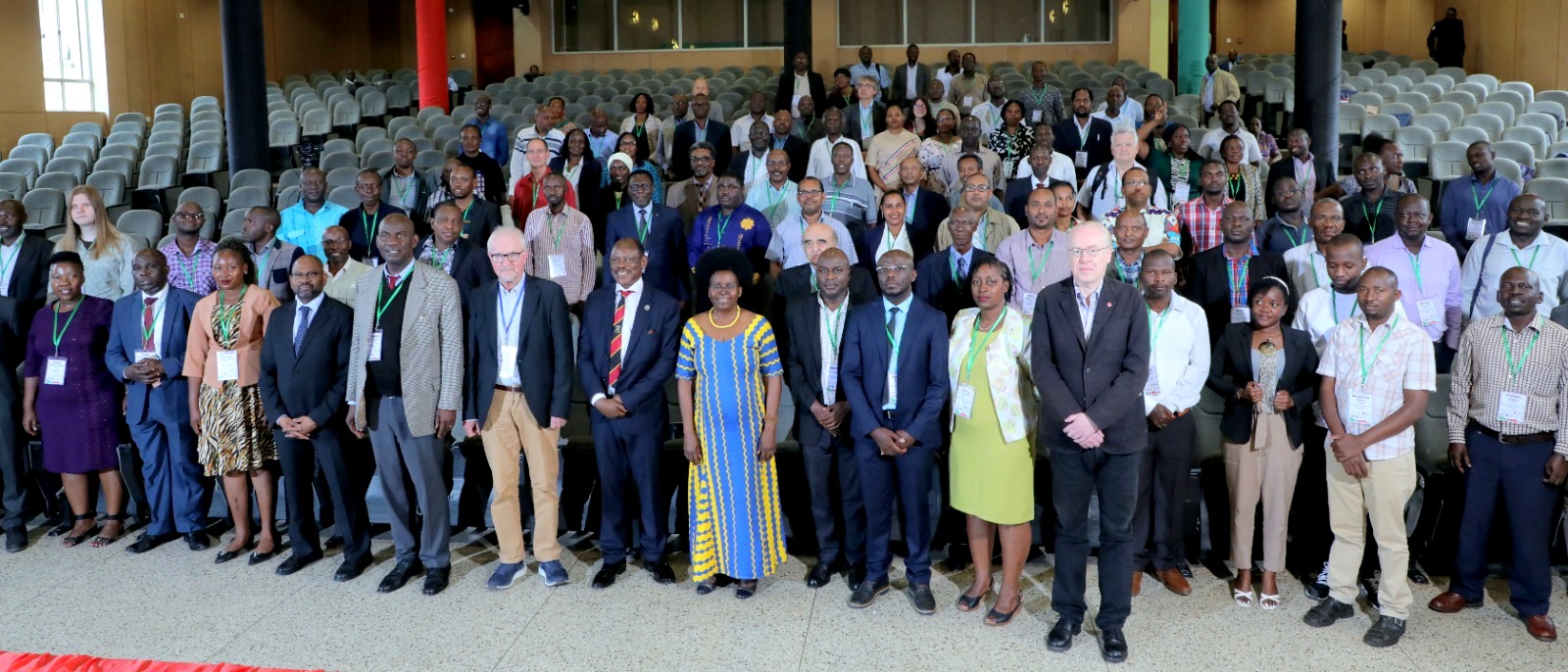
By Ritah Namisango
The Minister for Science, Technology and Innovations, Hon. Dr. Monica Musenero called upon mathematicians to ensure that mathematics speaks to the public in a language they could understand and use for economic development. This was during the opening of the four-day joint African-Nordic Mathematics conference that was held at Makerere University under the theme, “Celebrating 20 Years with ISP/EAUMP/SIDA, 10 Years with CIMO/HEI-ICI and Commencing the NORHED II-Funded Mathematics for Sustainable Development Project from 1st to 4th August, 2023.
The Conference brings on board over 150 mathematicians from 15 countries including Kenya, Tanzania, Rwanda, Zambia, Namibia, Ethiopia, Botswana, South Africa, Australia, Norway, Hungary, Denmark, Germany, USA and Uganda the host.
The conference is aimed at stimulating regional and international collaboration in training, research and outreach; honouring Professor Leif Abrahamsson for his great contribution to the development of mathematics in the East African region and beyond; celebrating the new Mathematics initiative MATH4SD in the region under NORHED-II as well as providing a forum for interaction among mathematicians from Africa and beyond with a view of sharing experiences in mathematical training, research and outreach activities.
Officially opening the Conference, Hon. Monica Musenero, an alumna of Makerere University informed the mathematicians that linking mathematics with science, technology and innovation is a key driver to economic development. So, when people are isolated and separated from such an important subject, leaving it in an academic corner, we miss 50% of the development. She appealed to the mathematics researchers to break down their findings to make them relevant to the entire public. She advocated for mathematics publications that can be read, understood and appreciated by the public for economic growth.
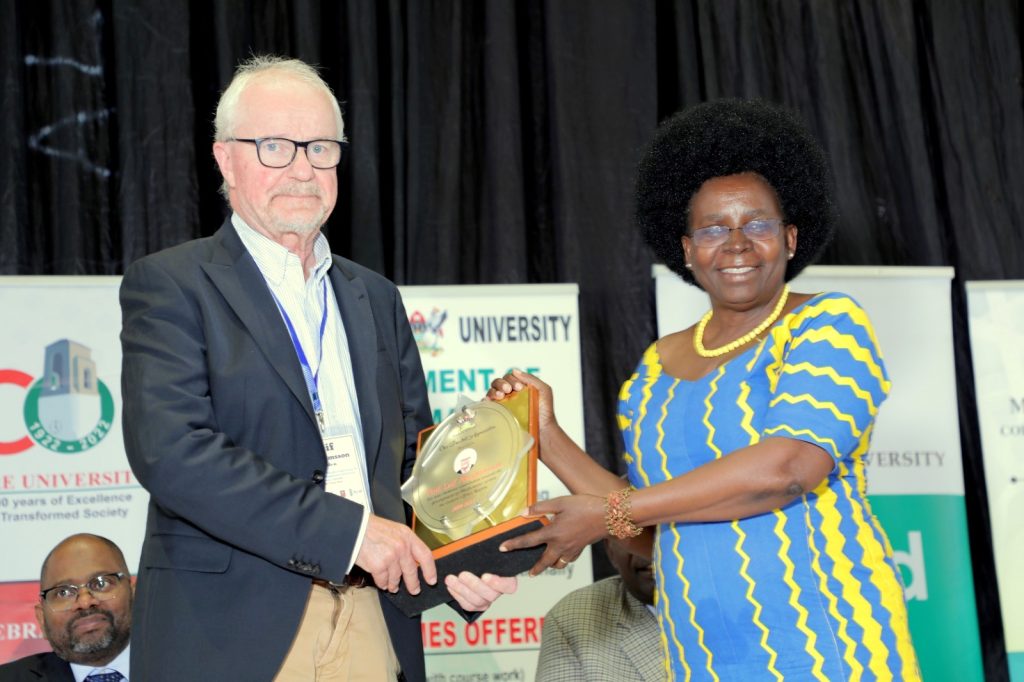
“If we are to have our economy grow, then we are going to come back to the corner of science and start to interpret what it means. We really need to functionalize the definition of mathematics. In simple terms, science is knowledge. I can speak that to a kindergarten pupil and they understand it. I am sure that people here have very specialized knowledge, but it has to be translated into technology and simply using mathematics to develop tools. I am sure there are very many tools that have been developed. However, for the public, we find it difficult to see those tools. So, we need to understand them such that they can speak and make sense to us,” Hon. Musenero said.
The Minister said that the academia struggle to find funds partly because some of the people who would provide those funds are not able to translate the mathematics language. She stated that if they could focus on translating the mathematics to make it visible, then obtaining funds would be quite easy. She thus urged the researchers to use their findings to create knowledge and develop tools to find solutions to people’s problems, where they live, work and spend their day to day lives.
“I would like to bring this from our side by saying that, please let mathematics speak to us. Make the PhDs speak to us. In science we do research and generate knowledge, but the knowledge must be transformed into tools. For instance, we used calculators in schools, but we never realized the mathematics in those calculators. That is a task that we have to walk this journey to translate the science into enterprises, such that we can bring about our socio-economic transformation.” She remarked.
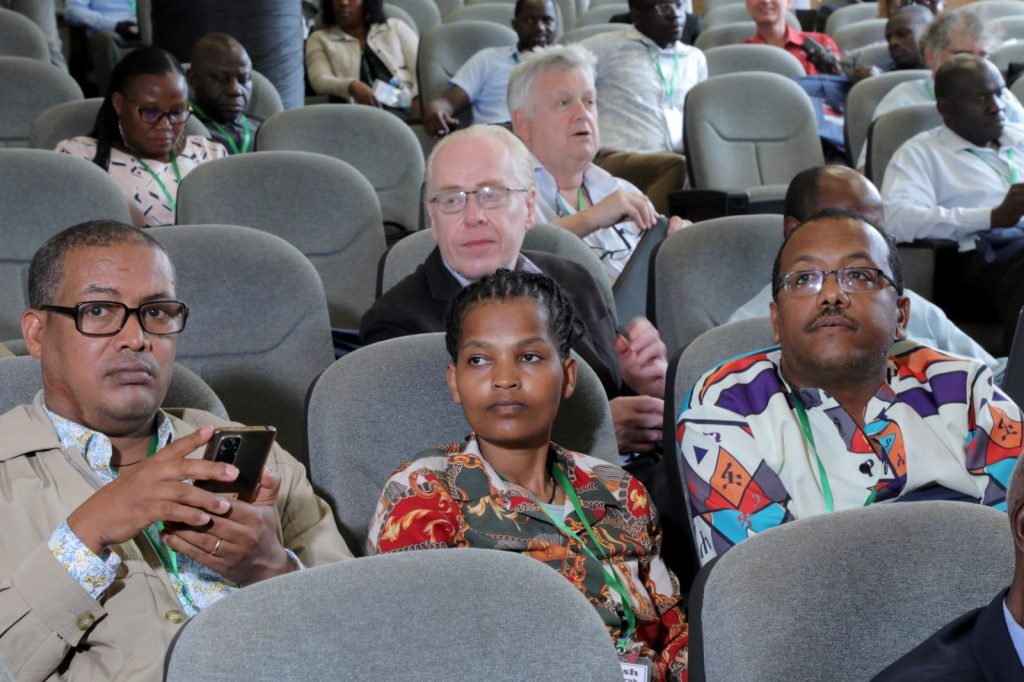
Speaking about transforming Uganda’s economy, Hon. Musenero said that the country is focused on the socio-economic transformation. She stated that Science is no longer just a sector, but an approach to economic development. She highlighted that in order to take science as an approach, we can only do that if we are able to bridge the gap between knowledge and understanding. She emphasized that research is the only avenue for production of high caliber human resources as well as the best input into a country’s human capital. “When the nation is engaged in research, it rapidly increases its human capital and following closely would be the development of the nation and the transition from a commodity based economy to a science led economy.”
On behalf of the Government of Uganda, the Hon. Musenero acknowledged the Nordic governments for the generous support towards the advancement of research and innovations in mathematics in Uganda. She also committed to working with key players to ensure that the investments would be effectively translated to ably formulate well informed policies that will lead to sustainable development as well as development of tools and innovations.
To the mathematics researchers and graduates supported under the NORAD program, the Minister invited them to a dialogue so that they discuss strategies that will benefit the country. “I invite the Masters and PhD graduates, especially those from Uganda for a dialogue to see how to develop our country together and retain you in the country. We badly need you now, but many have in the past exited the country because they have not been seeing where else to go. We also need to find a way on how those who already left the country can come back home to work together.”
The Vice Chancellor, Prof. Barnabas Nawangwe commended the Nordic governments of Sweden, Norway, Finland and Denmark for supporting Makerere University and other regional universities in the areas of human resources capacity building, research, library sciences and information technology and infrastructure development.
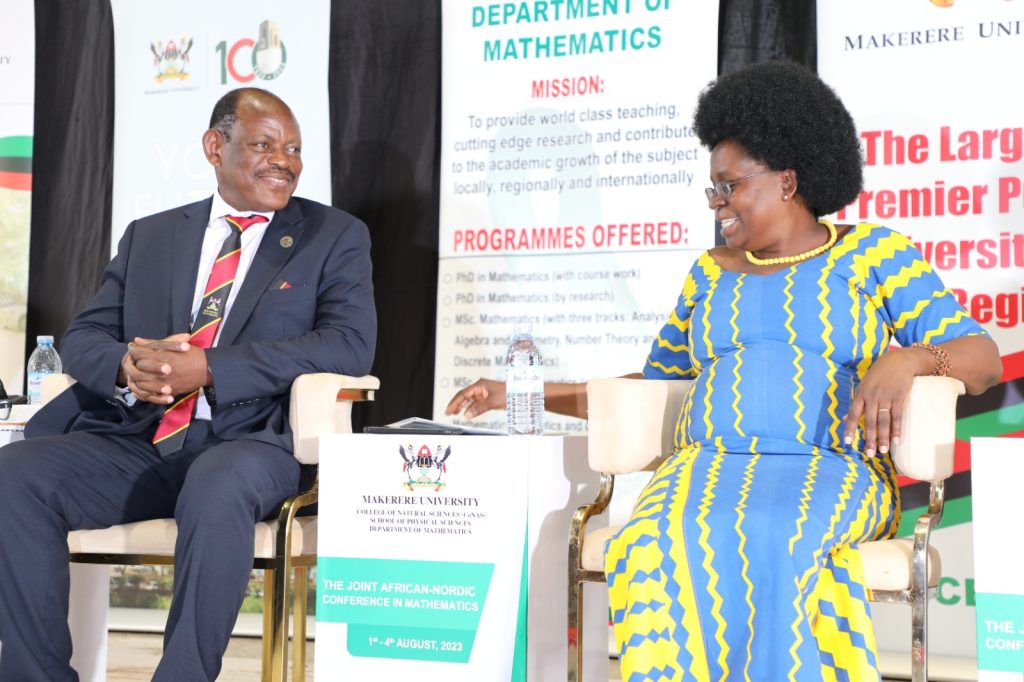
“The Nordic support has greatly played a relevant role in helping Makerere University to deliver our core functions which are teaching, research and innovations and partnerships. Makerere University has benefited significantly from the very strong relationship and support from the Nordic countries. In particular, I must say that Sida and NORAD have helped us to come out of those difficult years and they have helped us to train more than 600 PhDs over the last 20 years. We are indeed very grateful,” Prof. Nawangwe said.
Prof. Nawangwe called upon staff, individuals and universities from Africa that had received the NORAD and Sida support to use it for capacity development and multiply the benefits of that capacity. He said that if that support is put to good use, it will help Africa to get out of the prevailing circle of poverty.
The Vice Chancellor underscored the value of mathematics. He categorically stated that mathematics is the mother of all sciences, and without it, we could not get anywhere. According to Prof. Nawangwe, the work of mathematicians is the foundation of everything that we want to do in science and developing our countries.
During the opening ceremony, Makerere University recognized Professor Leif Abrahamsson for his valuable and selfless contribution towards the development of mathematics in the East African region and Uganda in particular.
“Today, we are honoring you Professor Leif Abrahamsson for the work you have done. As part of establishing everlasting memories of you in the East African region, Makerere University will establish the Leif Abrahamsson Chair for supporting mathematics in the Region.”
The Vice Chancellor noted that to solicit for funds to support the region in Mathematics, there is need to use the name ‘Leif Abrahamsson’ to permanently get support for Mathematics. He revealed to the participants that through this Chair, the University would target to raise at least USD 500,000 per year to support Mathematics in the East African region.
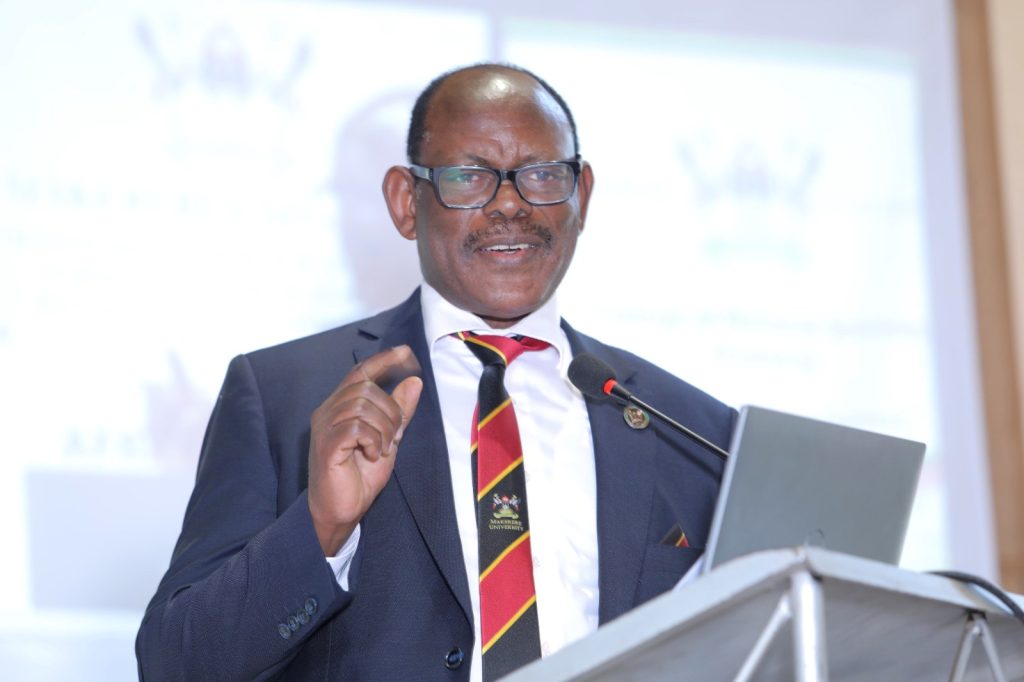
Prof. Bengt-Ove Turreson, the Director-International Science Program (ISP) said that ISP at Uppsala University-Sweden works to strengthen the scientific knowledge, research capacity and postgraduate education in the basic sciences that include mathematics, physics and chemistry in countries where such capacity is non-existing or weak.
As they celebrated 20 years of existence of the Eastern Africa Universities Mathematics Programme (EAUMP), Prof. Bengt-Ove Turreson recalled that in the early stages things quite difficult, but became better in 2002 when EAUMP was established. The network which started with three (3) countries namely Uganda, Kenya and Tanzania, was later extended to Rwanda and Zambia, and it has played an important role in building human capacity. In the recent years, ISP started supporting PhD programs in the region. They started with supporting four (4) research groups.
“What we are doing in terms of global research is very unique. There is no other country that does this kind of work. All the countries are proud of the work we have been doing. We started working in 1961. We provide long-term funding, coordination and mentoring to research groups and regional scientific networks at universities and research institutes in low and lower-middle income countries in Africa, Asia and Latin America. Our main funding comes from the Swedish Government through the Swedish Development Cooperation Agency (Sida),” said the Director.
Prof. Turreson remarked that in addition to seminars such as the ongoing mathematics conference at Makerere University, EAUMP would establish summer schools to bring on board young mathematicians from the different parts of the world to enhance the new modern mathematics.
The Inter-University Council for East Africa (IUCEA) disclosed that mathematics is proven to be indispensable to human development and economic growth since the time of the industrial revolution.
“The third revolution brought about by the advance in communication and information technology finds its origin from applied mathematics and physics to a larger extent. We are now in the fourth industrial revolution which has been brought largely by data and artificial intelligence, which too find their roots from different parts of mathematics such as probability and statistics. The initiatives that involve AI or data science are driven by mathematics. Therefore, for the region to catch up with technological advances, it should prioritize mathematics, education and research,” said Prof Rai, Deputy Executive Secretary-IUCEA who represented the Executive Secretary- Prof. Gaspard Banyankimbona.
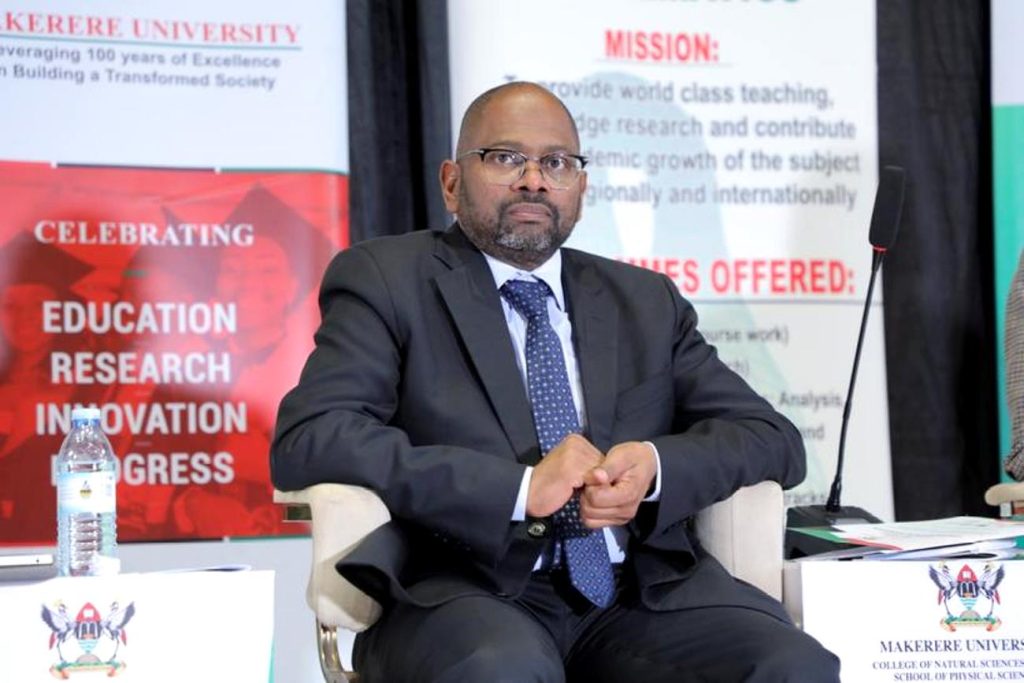
Prof. Idris Rai assured participants that the interactions, engagements and networking of researchers will bring out more collaborative research activities to the region in addition to expanding knowledge in research and mathematics.
Counting the gains, Prof. Stephen Luketero, the overall coordinator of the Eastern Africa Universities Mathematics Programme (EAUMP) that was established in 2002, to alleviate the dismal state of Mathematics in Eastern Africa noted that with support and funding from Sida and NORHED, the region has been enriched with numerous developments in terms of knowledge. He stated that a substantial number of PhDs has been produced across the region in excess of 50 PhDs and countless number of masters. He also noticed that as a result, the number of females enrolling for PhDs in Mathematics was tremendously increasing.
“We have been able to have quite a big number of students in pursuit of the doctorates and post doctorates over a time. The research groups have been formed and out of such research collaborations, it is quite easy for the teams to come together and participate in writing research grants that can enhance research within the region. There was a wing that was created to cater for the advancement of knowledge and progression of female students and this has also run very well. Quite a number of graduates we are producing have been able to bridge the gap between male and female mathematicians.” Prof. Luketero said.
Speaking about Sida, ISP, NORAD support, CIMO and the achievements and future of EAUMP/NORHED, Prof. John Magero Mango the EAUMP Internetwork Coordinator said that with support under the NORDIC program, they have trained 11 PhDs in mathematics of which 5 are from Makerere University and 6 from University of Dar es Salaam. In addition, he stated that over 100 Masters have been supported with over 100 publications.
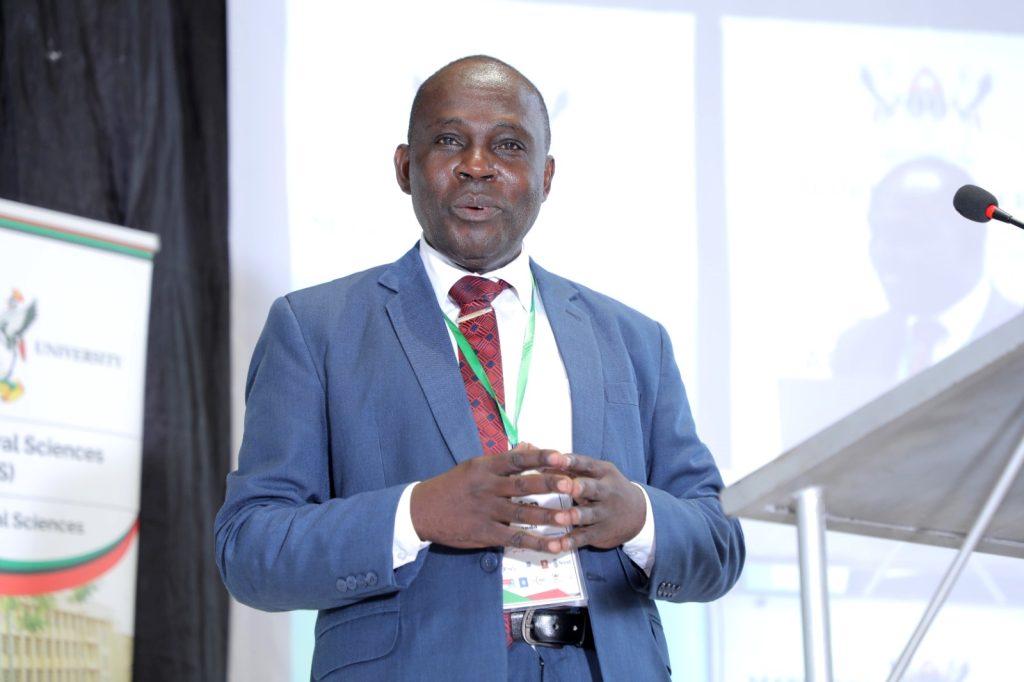
“The NORAD fund at Makerere University from 2021 to 2026 is supporting five (5) PhDs. We evaluated our progress and as we review the curriculum which we formed under Sida, we are also concentrating on the outreach programs for Data Computation skills via mathematics. Those are key innovations that are worth recognizing at this moment under the support of our NORDIC friends. Under CIMO, we have greatly benefitted in extending our knowledge to the local industries.” Prof. Mango said.
The Principal, College of Natural Sciences at Makerere University, Prof. Winston T. Ireeta mentioned that organizing such a conference that brings on board 15 countries was a great achievement for the College, the Mathematics Department and Makerere University at large.
He said, “This gives us credibility and great visibility as Makerere University. We also have some goals we have set up to achieve some of which are through collaborations and interacting with others. Let us work on achieving them. Collaborations and networking are very important.”
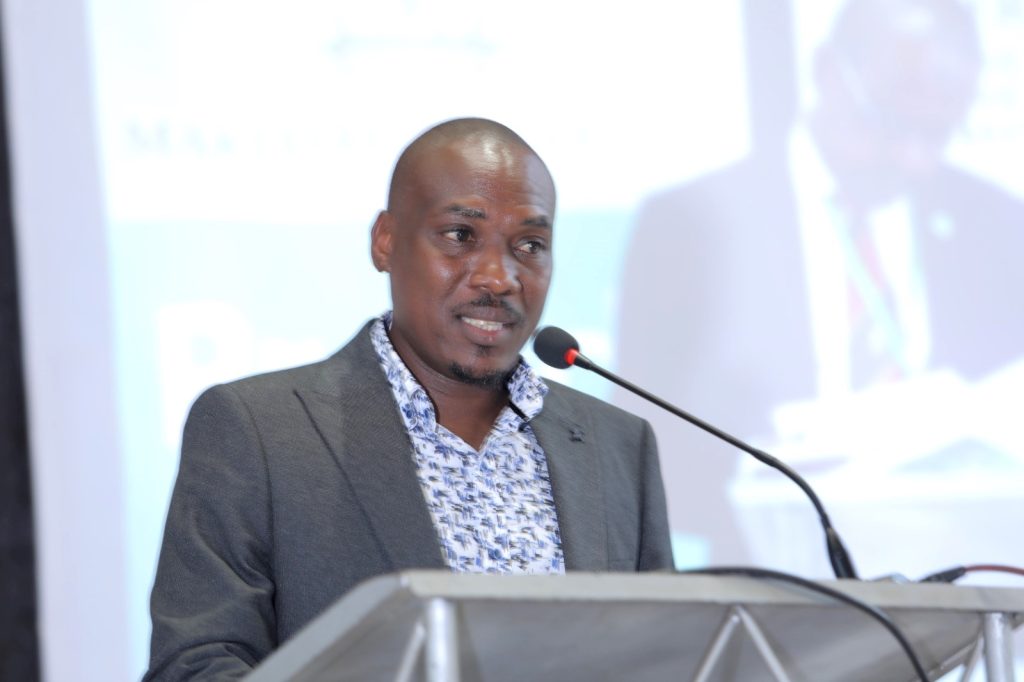
He applauded the Local Organizing Committee chaired by Dr. Godwin Kakuba and the professors who have greatly helped during examinations and PhD defenses. He also thanked the funders of the mathematics projects, ISP and Nordic governments for the support they have rendered in the promotion of mathematics.
Taking stock of the collaborations with major universities in Kenya, Tanzania, Rwanda, Zambia, Ethiopia, Finland, Norway and many other universities in the region, Dr. Godwin Kakuba, the Head of the Department of Mathematics at Makerere University said hosting the conference provided a platform to celebrate the collaborations that had enabled the department to grow to such strength.
“As the head of department, I am very proud of these achievements and very optimistic about the future with profound joy. When we look back to so many years ago, about 20 years, the number of PhDs was minimum, but now, having a PhD has become normal. The department of mathematics is therefore ready to take that direction towards transforming Makerere University into a research-led institution,” he remarked.
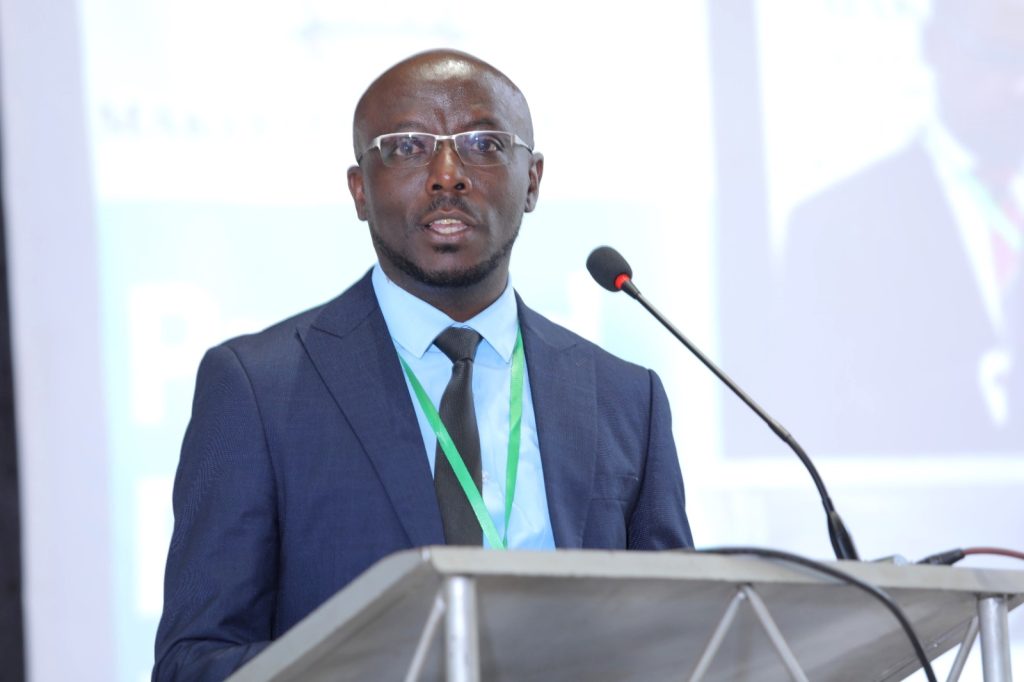
Dr. Kakuba added that they will always measure their strengths annually basing on the number of publications made, the number of graduate students trained, number of research workshops and conferences organized and hosted as well as the goals achieved each year.
During the four day conference, research papers and poster presentations focused on the following areas: Algebra, Graph Theory, Real and Complex Analysis, Topology and Geometry, Dynamical Systems, Experimental Pure Mathematics, Biomathematics, Data Science, Biostatistics, ODES and PDES, Financial/Insurance Mathematics, Numerical Analysis, Fluid Dynamics, Operations Research, Stochastics, Applied Probability and Mathematical Statistics, Mathematics Education, Optimization, Bioinformatics, Clifford and Hypercomplex analysis as well as Combinatorics.
You may like
-
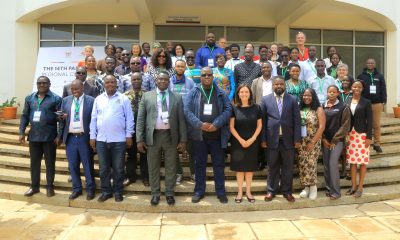

Harmonizing Africa’s Future through Musical Arts Education
-
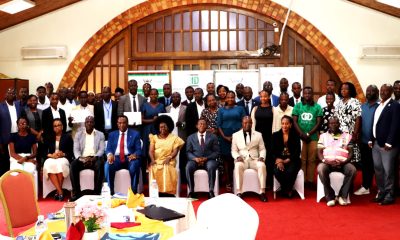

Swedish Ambassador Calls on Uganda to Lead Africa’s E-Mobility Revolution
-
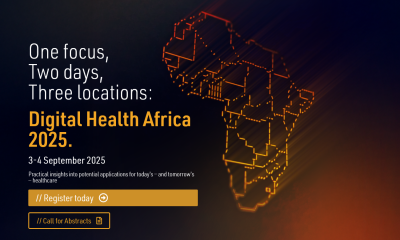

Call for Abstracts: Digital Health Africa 2025
-


CoCIS CIPSD Online Short Courses Jul-Nov 2025
-


CoNAS Participates in the 2025 National Science Week Exhibition
-
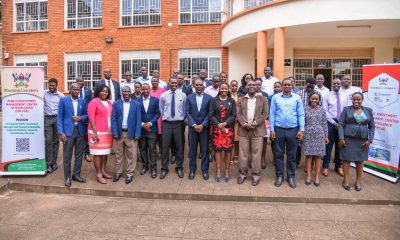

PIM Centre of Excellence Launches KCCA Training in Public Investment Management
Natural Sciences
CoNAS Participates in the 2025 National Science Week Exhibition
Published
2 weeks agoon
June 17, 2025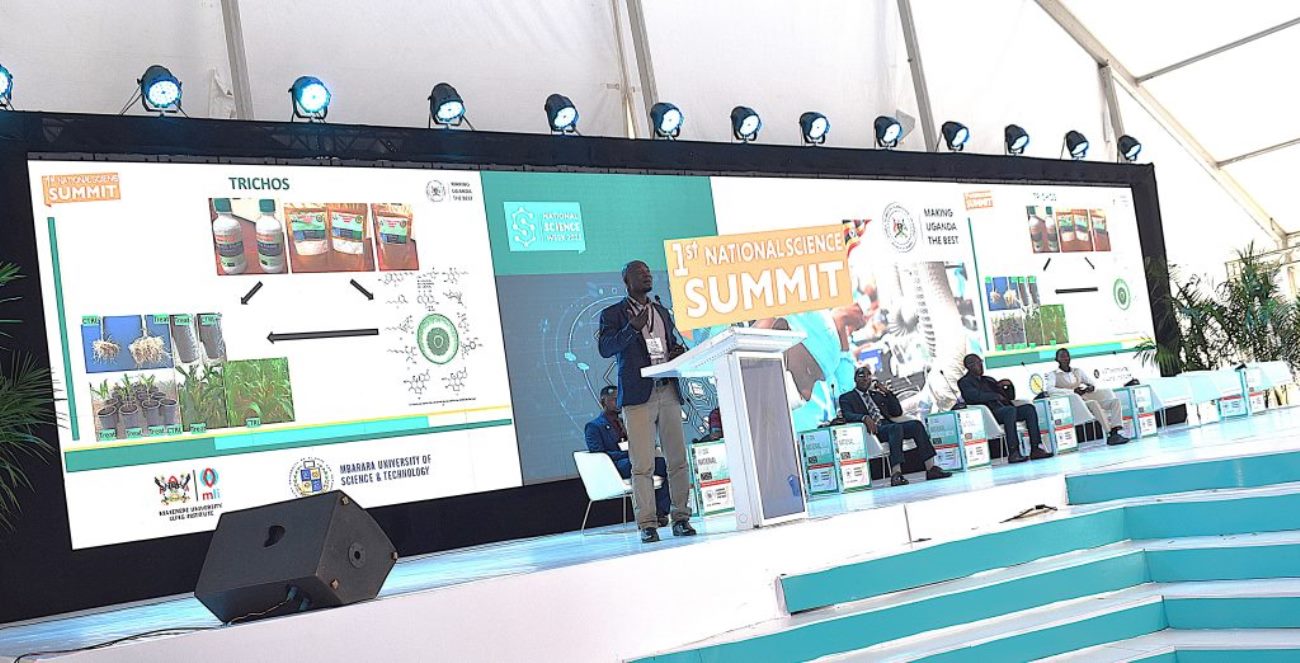
*****15 students from different departments at CoNAS are showcasing their projects.
Over 300 Ugandan innovators, among them students from the College of Natural Sciences (CoNAS) and other science-based colleges at Makerere University are participating in the 2025 National Science Week exhibition, currently underway at the Kololo Independence Grounds.
Launched in 2021, the National Science Week is an annual event organized by the Science, Technology, and Innovation (STI) Secretariat under the Office of the President. The exhibition serves as a strategic platform for showcasing Uganda’s advancements in science, technology, and innovation, both at the national level and on the global stage.
Held under the theme “Made in Uganda: Innovation to Market”, the 2025 edition (running from 15th-20th June) aims to highlight the country’s growing capacity to transform home-grown scientific ideas and research into viable, market-ready products and technologies.
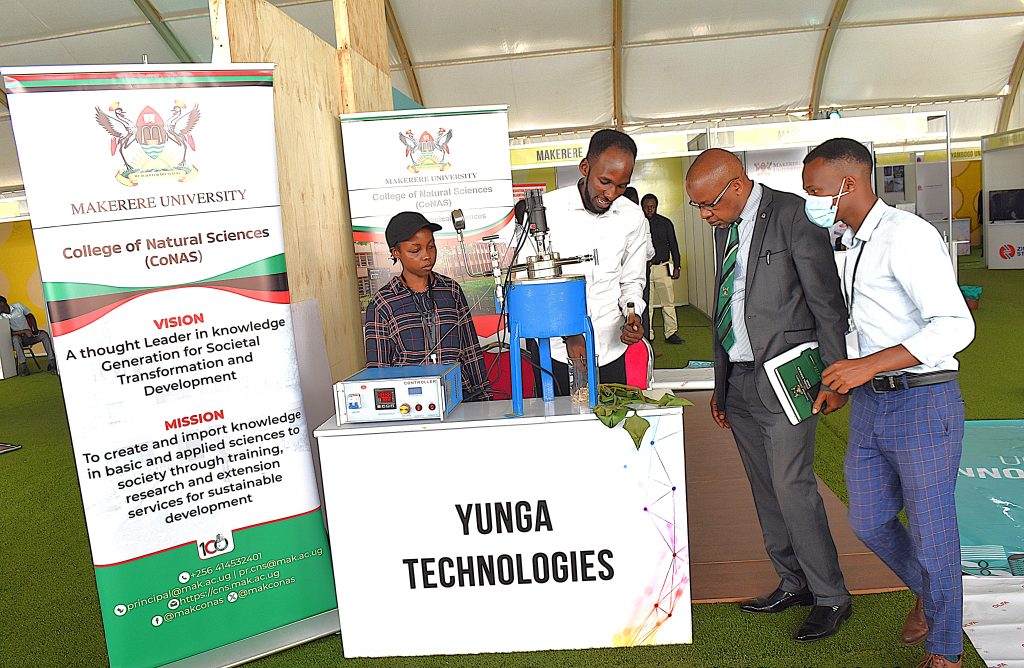
Key highlights from the official launch of the National Science Week
During the official launch held on 13th May 2025, the Minister of Science, Technology, and Innovation, Hon. Dr. Monica Musenero Masanza, outlined several milestones Uganda has achieved over the past year, including:
- The commencement of clinical trials for locally developed therapeutics, marking a significant step in Uganda’s biopharmaceutical sector.
- Notable growth in the electric vehicle (EV) industry, including the deployment of over 5,000 electric motorcycles and 27 electric buses across the country.
- Establishment of critical green infrastructure, including 140 battery swapping stations and more than 30 direct current (DC) fast chargers nationwide.
According to the Minister, these developments demonstrate Uganda’s advancing capabilities in green technology and sustainable mobility solutions.
The Minister also highlighted additional achievements by the STI Secretariat, including the revitalization of Sukulu Phosphates, the launch of both the Deep Tech and Climate Tech summits, and the operationalization of vaccine production lines for both human and animal health. Dr. Musenero expressed gratitude to the Government of Uganda for its continued support, emphasizing its strategic vision of leveraging science, technology, and innovation as a transformative vehicle to position Uganda as a continental leader in deep tech innovation.
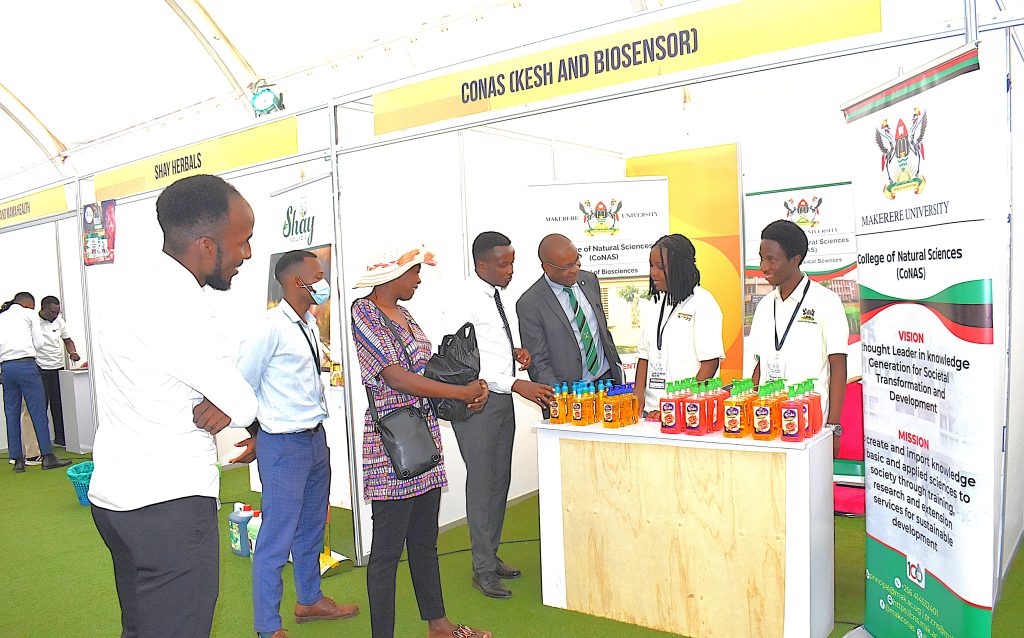
The 2025 National Science Week Activities
The National Science Week is designed to be an interactive experience for all attendees. According to Ms. Cathy Muhumuza from the STI, the exhibition will feature various activities including the official opening by the President of the Republic of Uganda, H.E. Yoweri Kaguta Tibuhaburwa Museveni, expected to take place on Thursday, 19th June 2025. Other activities will include policy dialogues, the Academia Day dedicated to young innovators, and the Investor Day providing a platform for innovators to connect with potential investors.
Additionally, the event will host a “Made in Uganda Supermarket,” allowing visitors to purchase products directly from exhibitors.
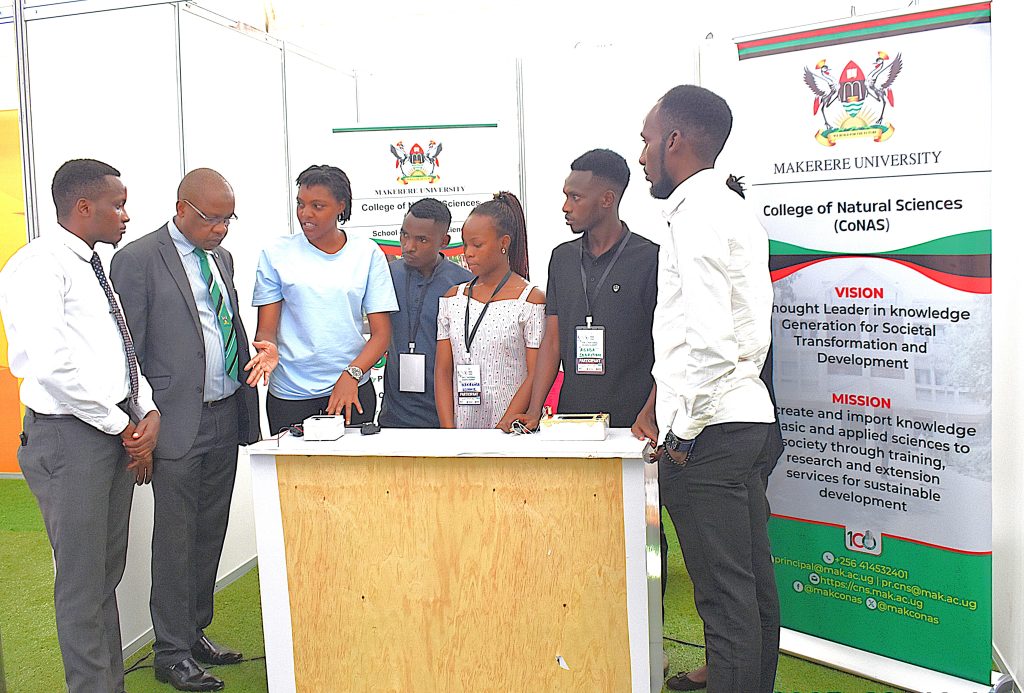
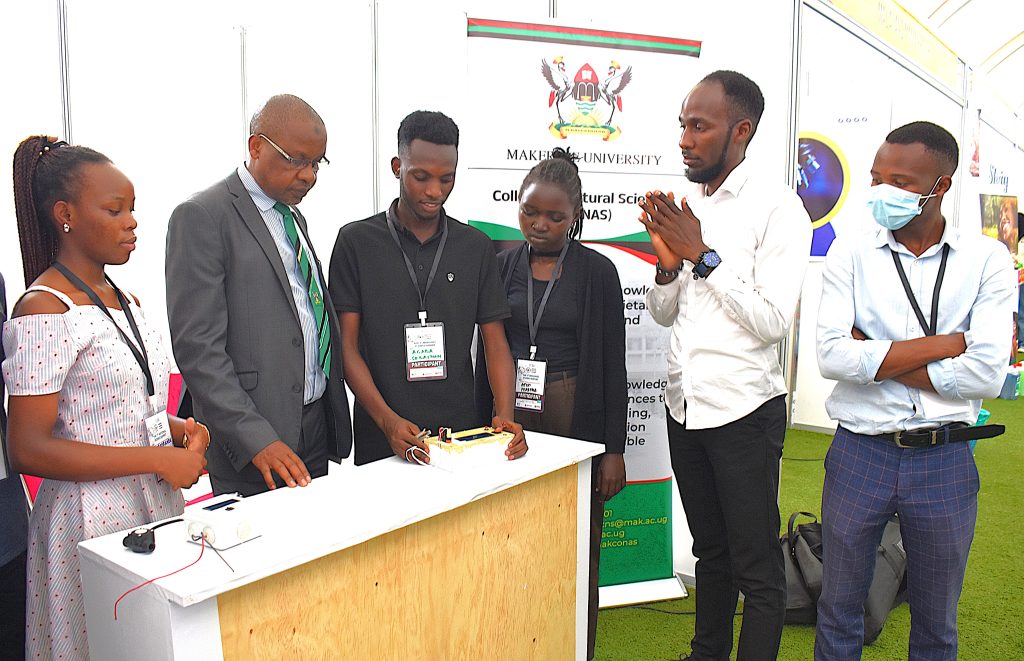
CoNAS Students’ projects
Among the many innovators featured at the exhibition are several talented student teams from CoNAS, presenting a diverse array of projects across scientific disciplines, including biotechnology and green energy. Guided by their lecturers and coordinated by Prof. Juma Kasozi, Deputy Principal of CoNAS, the students are showcasing the following projects:
- Anti-fungal and Anti-bacterial Gel Research Project
Team Leader: Mwebaze Bruce
Team Members: Atim Martha, Sebastian Jordan
This project explores the development of a topical gel with both anti-fungal and anti-bacterial properties, aimed at improving public health outcomes in communities with limited access to conventional treatments. - Minoxidil Production for Hair Regrowth
Team Leader: Keinembabazi Melissa
Team Members: Hashima Nanyiri, Nkamusiima Andrew
Focused on producing affordable, locally made Minoxidil, this project aims to provide a cost-effective solution for treating hair loss. - Infrared Biosensor for Aflatoxin Detection
Team Leader: Rubeihayo Randolp
Team Members: Namuleme Martha, Wabitereza Teddy
This innovation utilizes spectrophotometry to develop an infrared biosensor capable of detecting harmful aflatoxins in food, contributing to food safety and public health. - Biofuel Production from Water Hyacinth
Team Leader: Bill Garvin
Team Members: Kalanguka Patience Pearl, Nuwagaba Victor
The project converts invasive water hyacinth into sustainable biofuels using hydrothermal liquefaction, offering an environmentally friendly alternative energy source. - Automobile Fuel Gauge Detector
Team Leader: Ayebare Sam
Team Members: Achieng Rosemary, Nakirinda Winnie
This project involves the development of a reliable fuel gauge detector to improve vehicle fuel management and efficiency.
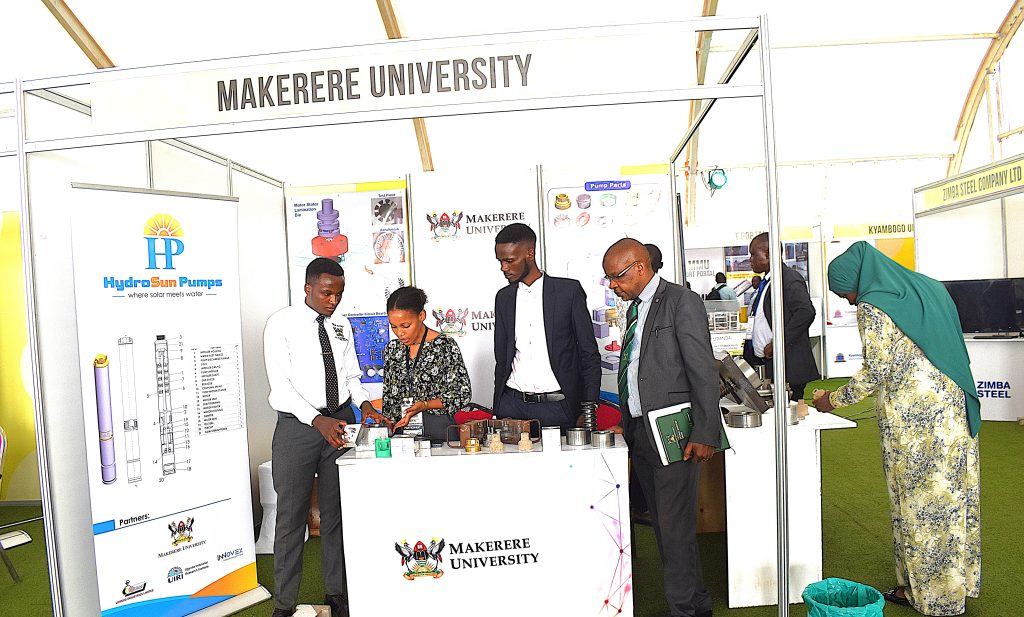
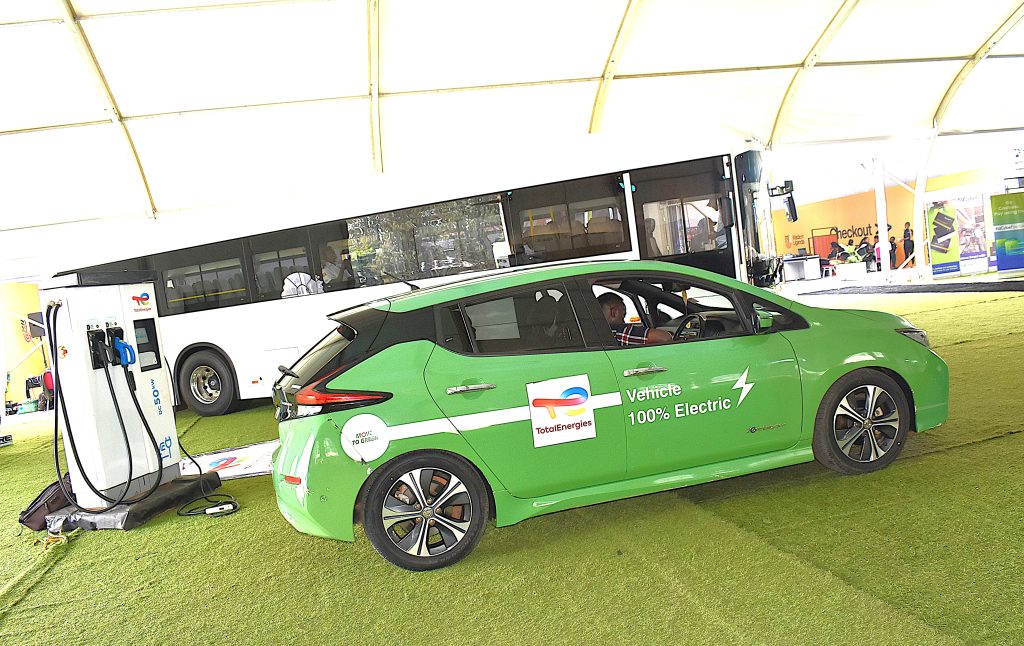
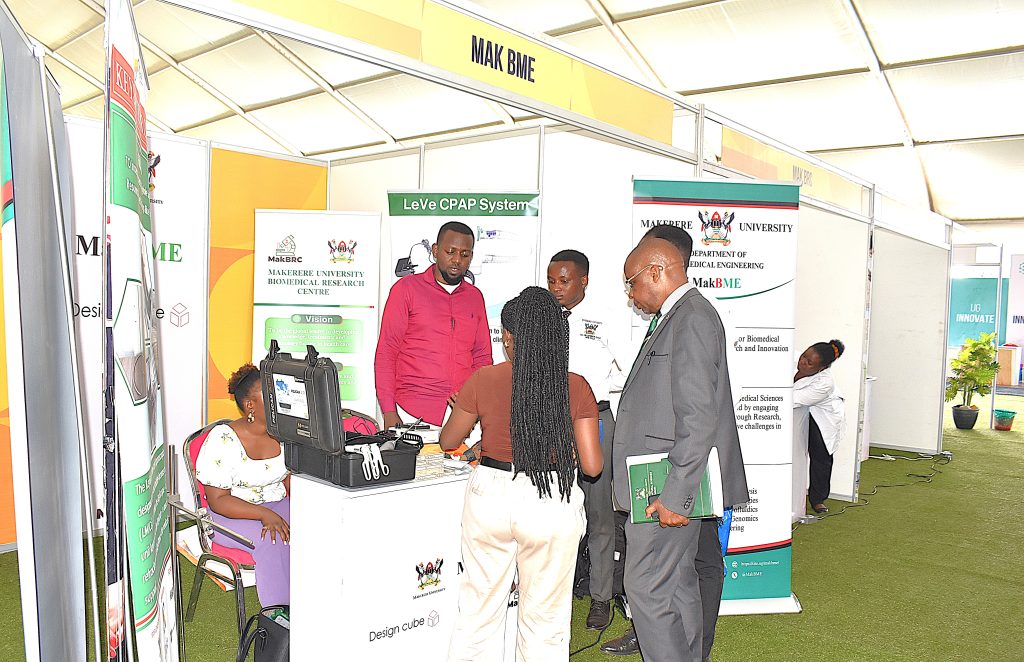
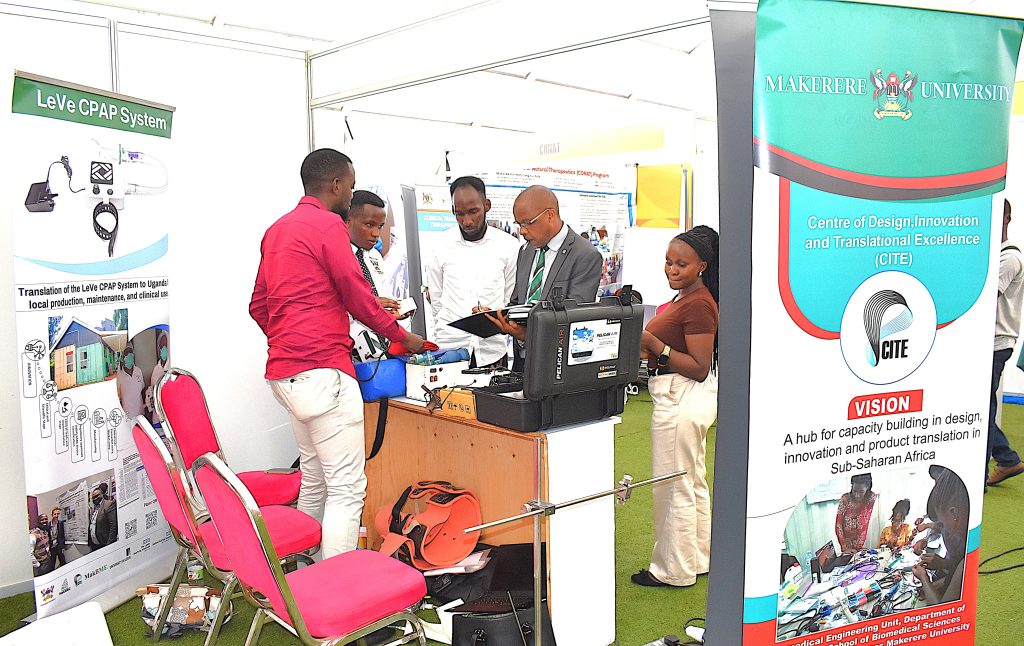
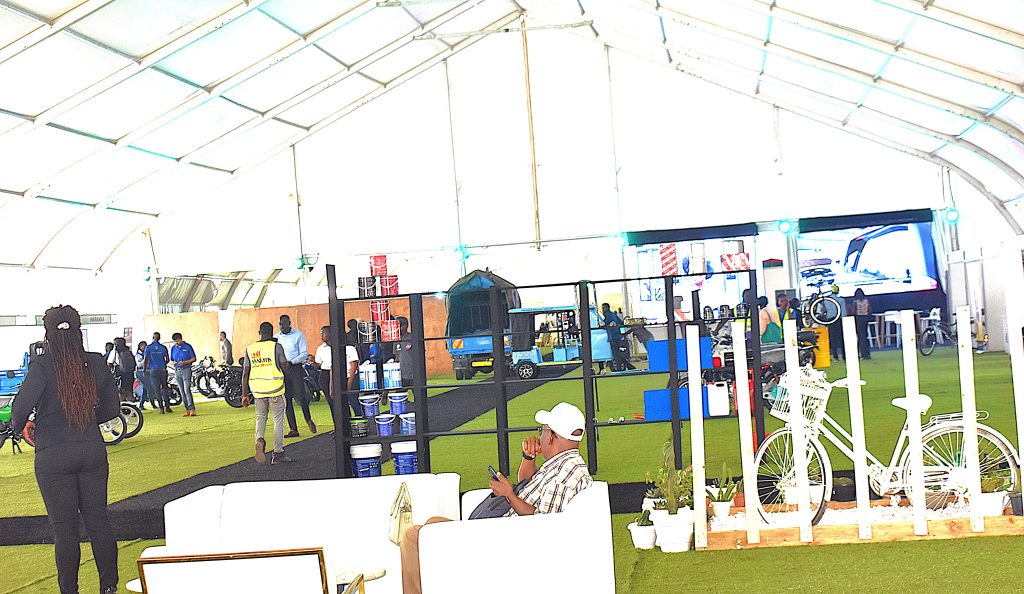
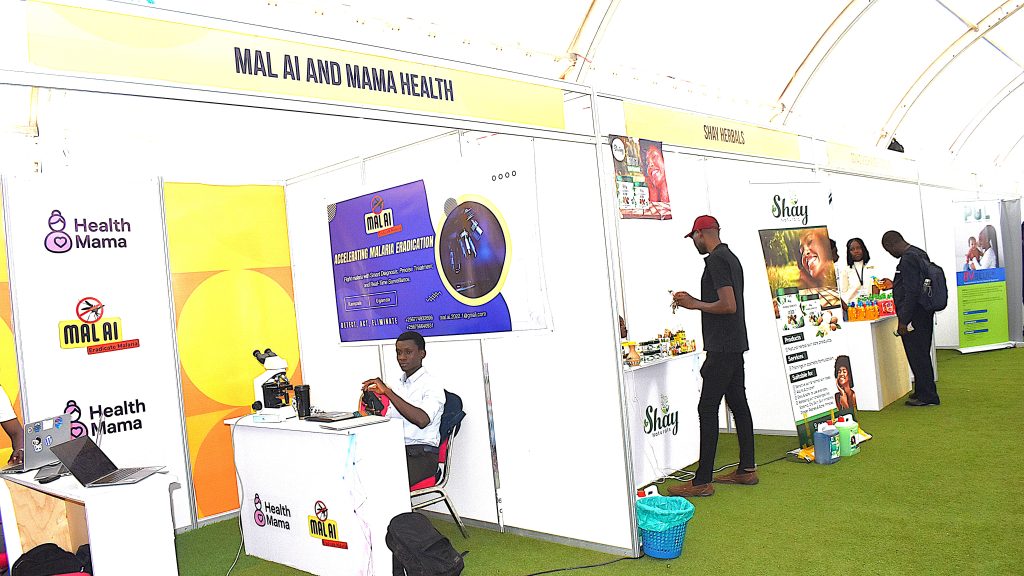
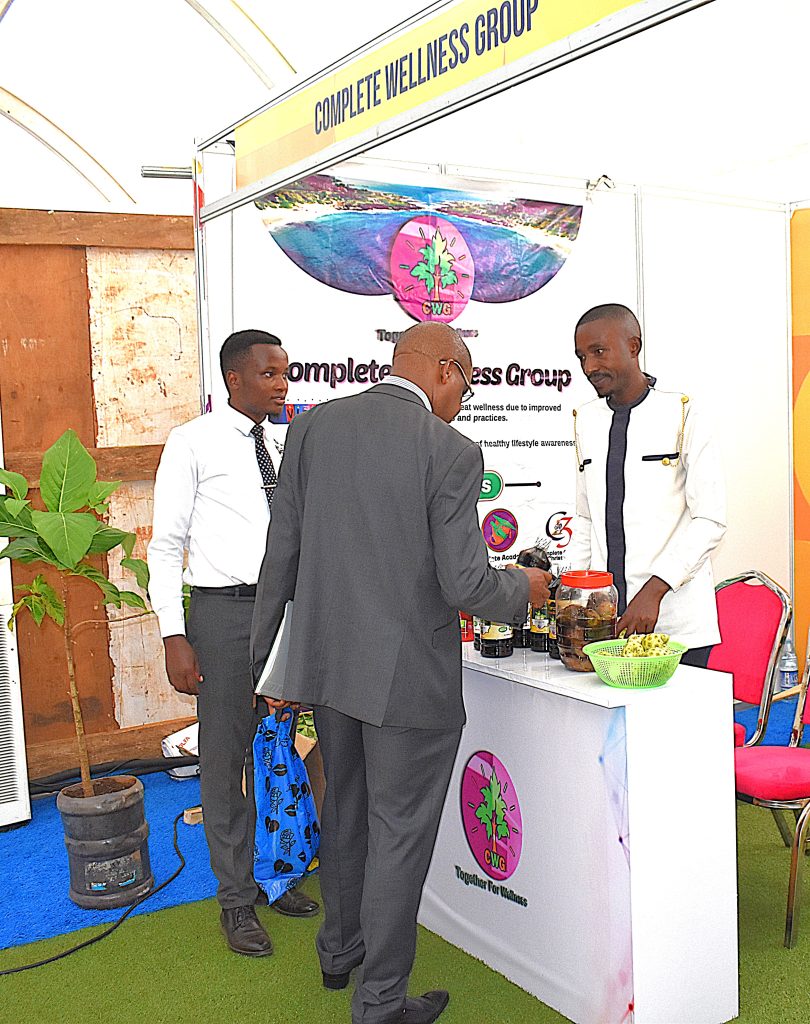
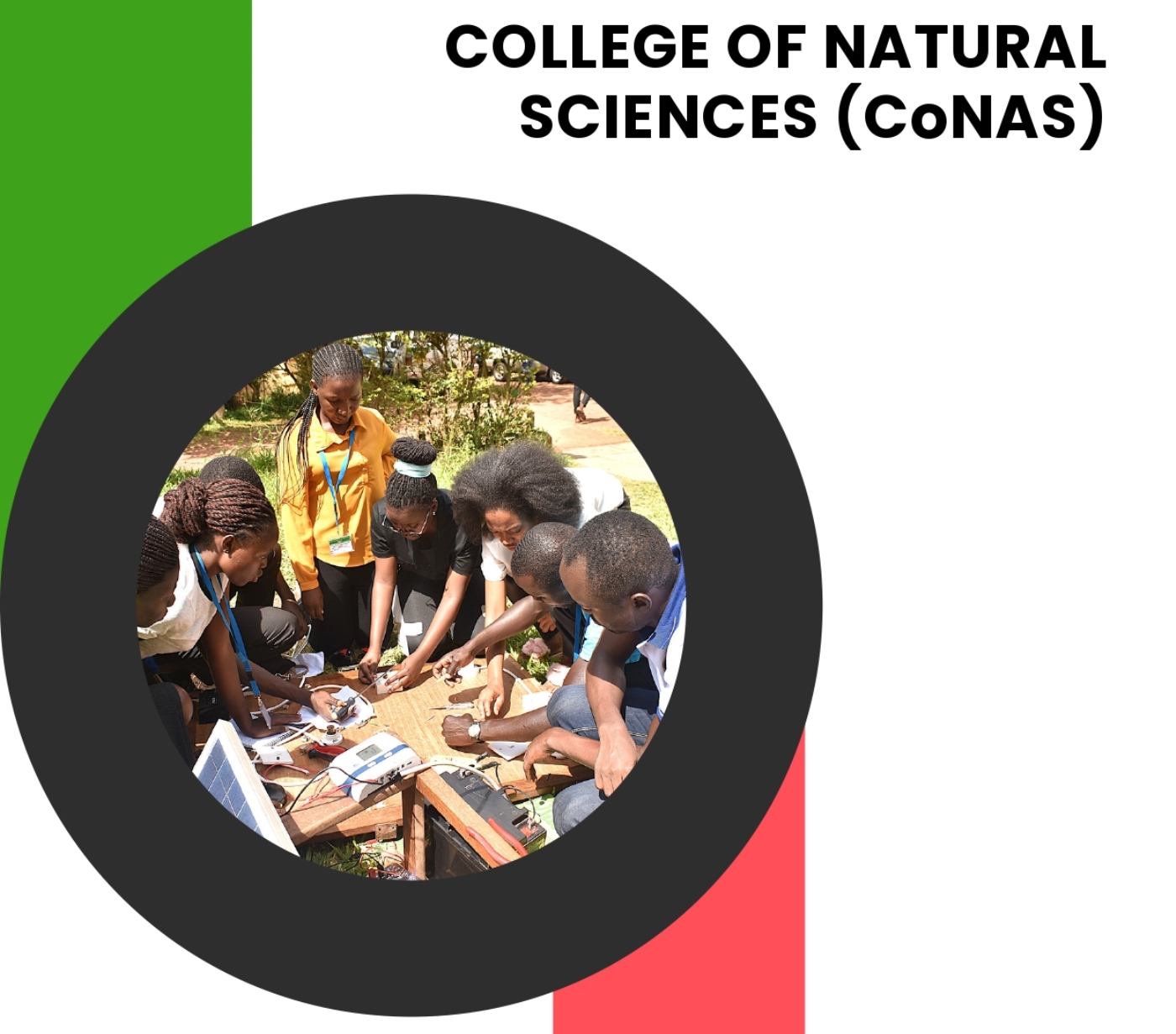
The College of Natural Sciences (CoNAS) is one of the 9 constituent colleges of Makerere University, dedicated to advancing scientific knowledge and education in Uganda.
Comprising two schools and seven departments, CoNAS offers cutting-edge research and academic programs across diverse fields, including chemistry, physics, mathematics, and biological sciences.
The College is committed to nurturing innovative thinkers and leaders who can tackle the complex challenges of today’s world through scientific exploration and discovery. With a long-standing tradition of academic excellence, CoNAS plays a central role in shaping Uganda’s scientific and technological future. It fosters a culture of critical thinking, problem-solving, and sustainable development. The College’s distinguished faculty, state-of-the-art laboratories, and collaborative research initiatives continue to inspire and develop world-class professionals who make significant contributions to both national and global progress.
This edition of the report highlights the activities and achievements of 2024, aligned with the University’s strategic focus on Innovative Teaching and Learning, Research, Innovations and Technology Transfer, and Strategic Engagement and Partnerships.
Natural Sciences
Preparing Graduates for Life after University: CoNAS Launches Terminal Seminar for Final Year Students
Published
2 months agoon
April 24, 2025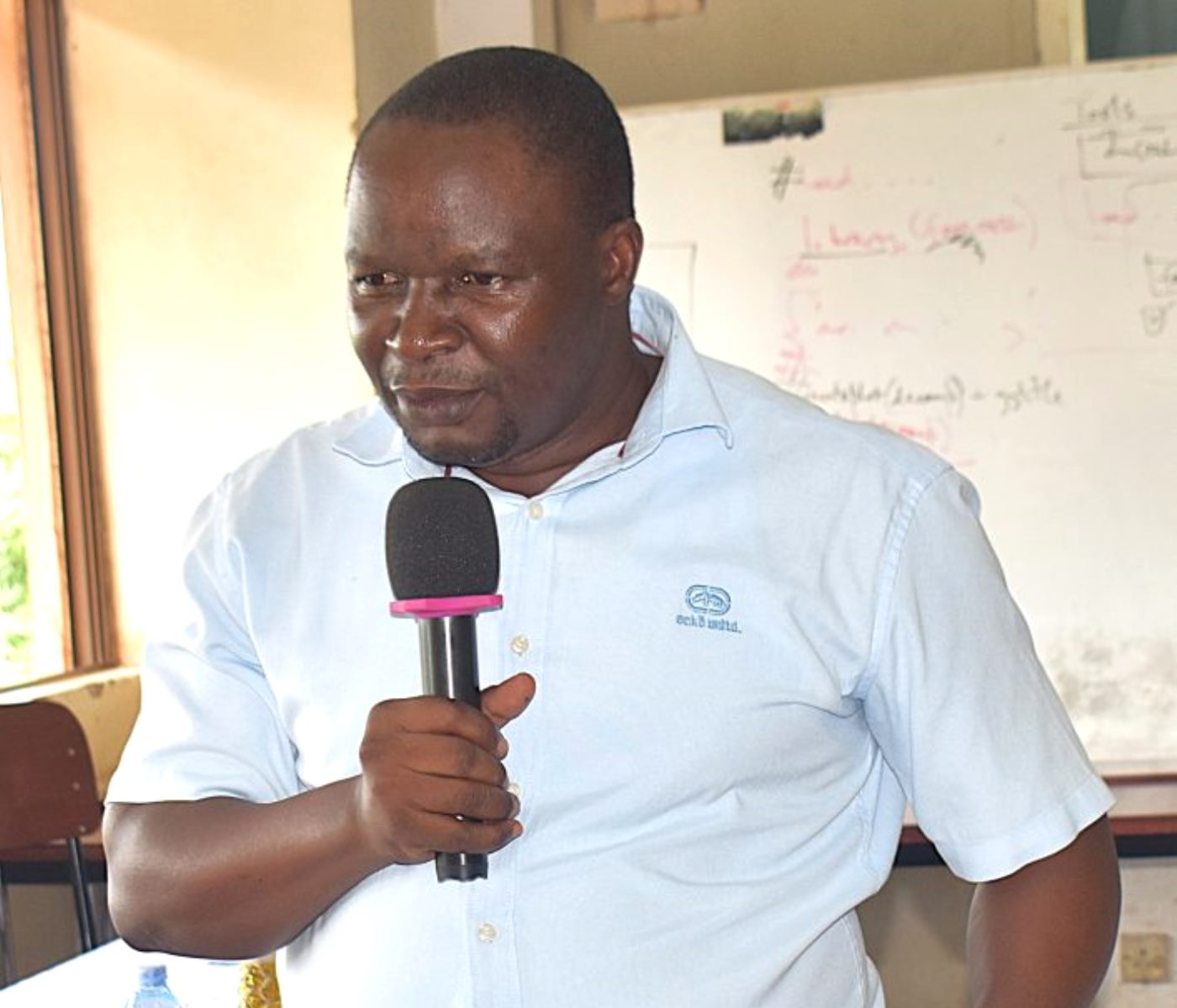
Relevance of the seminar
Transitioning from university life to the professional world can be a daunting experience for many graduates. This challenge is particularly pronounced in Uganda, the broader East African region, and across Africa, where many university leavers find themselves ill-equipped to face the realities of life after school. Issues such as limited career guidance, lack of personal development resources, and insufficient awareness of societal expectations leave many graduates unprepared for what lies ahead.
According to data from the Uganda Bureau of Statistics (UBOS), the youth unemployment rate in the country stands at approximately 13.3%. Each year, over 400,000 graduates join the job market, all vying for a mere 9,000 available formal employment opportunities. This staggering imbalance creates a climate of intense competition, often resulting in widespread disillusionment, anxiety, and in severe cases, depression – largely due to the absence of structured transition programmes to support young people during this critical phase of life.
While some graduates manage to find employment, launch entrepreneurial ventures, or pursue further academic study, many others struggle with prolonged unemployment or underemployment. This vulnerable group is at risk of turning to detrimental coping mechanisms such as substance abuse, criminal activity, or social withdrawal. One of the root causes of this unpreparedness is the lack of mentorship and real-world guidance in key areas such as workplace conduct, professional ethics, entrepreneurship, leadership, and personal financial management.
In response to this pressing need, the College of Natural Sciences (CoNAS) at Makerere University, through its School of Biosciences, has launched an innovative initiative – the Terminal Seminar/Symposium for Final-Year Students. Spearheaded by Heads of Departments within the School, the seminar is designed to bridge the gap between academic knowledge and the realities of post-university life by equipping students with essential life and career skills.
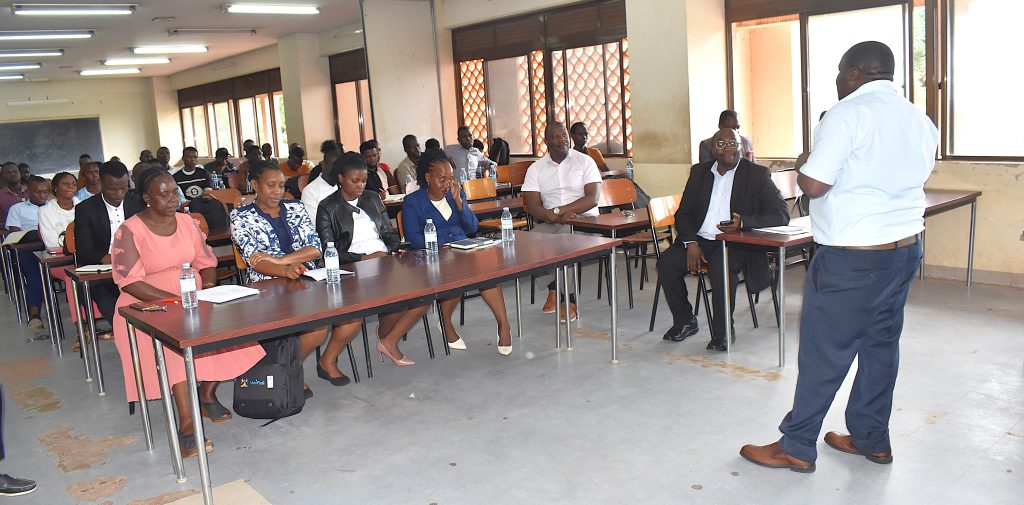
Objectives of the Terminal Seminar
The seminar aims to:
- Impart practical knowledge on workplace ethics, professional behaviour, and employability.
- Cultivate entrepreneurial thinking and leadership skills, enabling students to create their own opportunities.
- Provide strategies for coping with unemployment, social pressure, and the transition period.
- Raise awareness about mental health and equip students with tools to manage transition-related stress.
- Offer insights into navigating employment in public and private sectors, non-governmental organizations (NGOs), and the global job market.
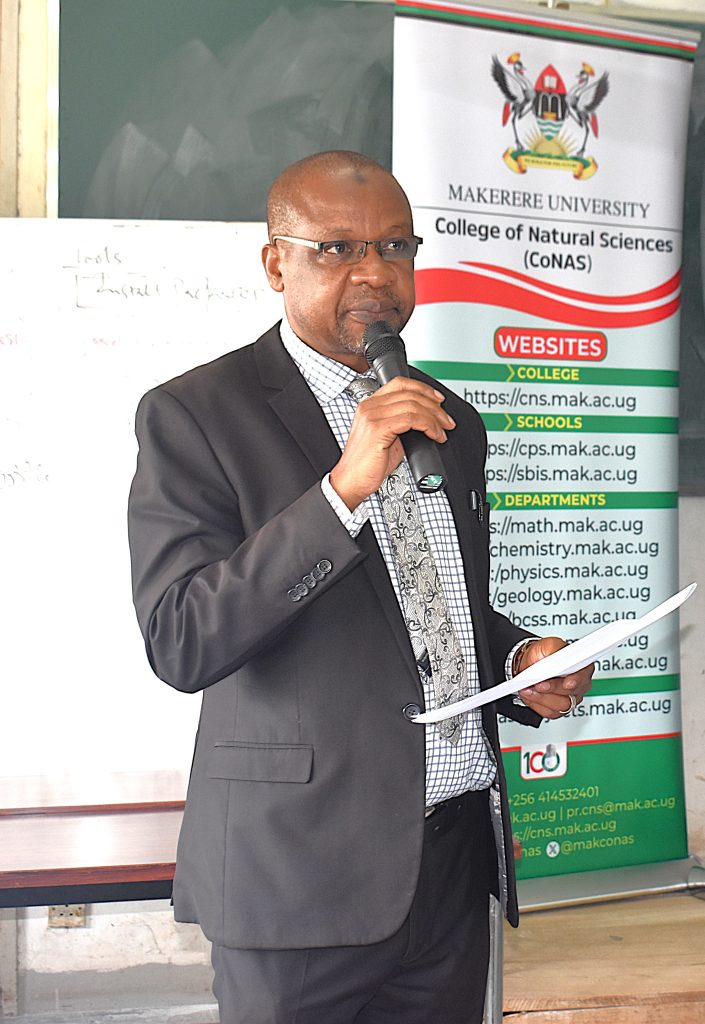
Expected Outcomes
By the end of the programme, students are expected to:
- Gain a broader awareness of career and self-employment opportunities.
- Develop realistic expectations about the challenges and opportunities post-university.
- Experience reduced levels of frustration and vulnerability to harmful behaviours.
- Build connections and networks with industry professionals and mentors.
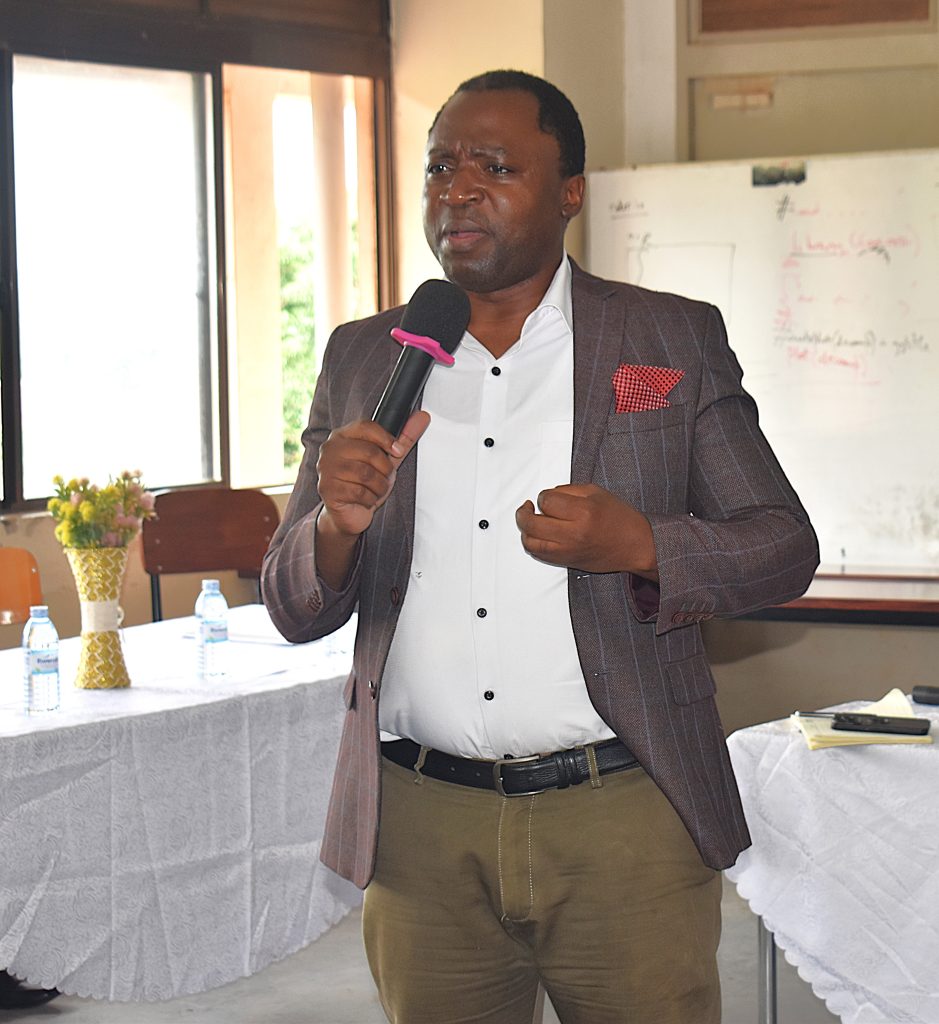
2025 Terminal Seminar Event Highlights
On 23rd April 2025, CoNAS held its flagship Terminal Seminar for Final Year students set to complete their studies in June 2025. The seminar was coordinated by Dr. Godfrey Kawooya Kubiriza, Head, Department of Zoology, Entomology, and Fisheries Sciences, with support from Dr. Barbra Nerima and Dr. Joel Isanga, both faculty members from the Department of Biochemistry and Systems Biology.
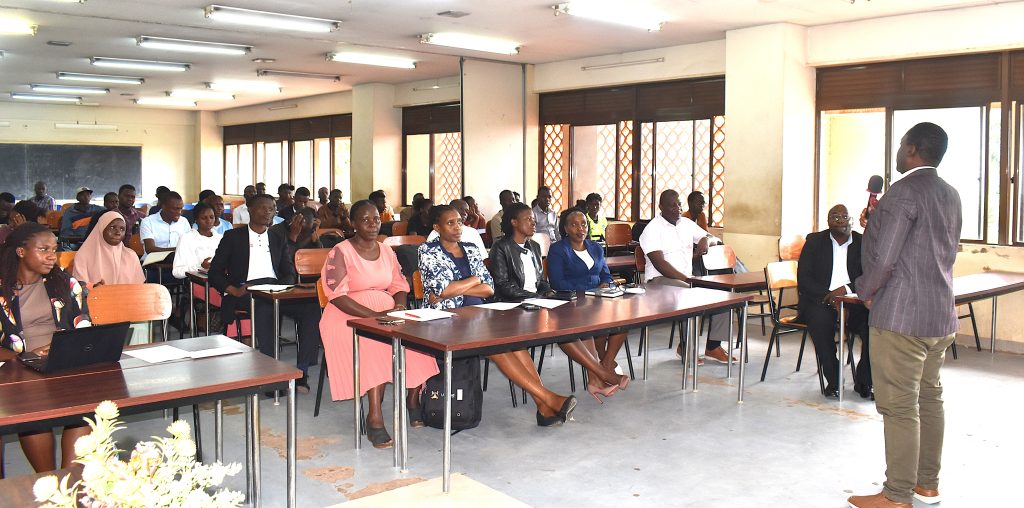
The event featured a series of empowering sessions, designed to help students navigate the transition from academic life to the professional world. Key topics included career planning, workplace ethics, entrepreneurship, and mental well-being.
A line-up of seasoned professionals and motivational speakers – including Mr. John Walugembe, Executive Director of the Federation of Small and Medium Sized Enterprises Uganda, and Dr. Catherine Mbidde, Ag Director, Makerere University Innovations Pod (UniPod), also Lecturer at the School of Business at CoBAMS, shared their personal journeys, professional insights, and practical advice for thriving beyond the university walls. Other Speakers included Dr. Alex Behakanira from the Department of Mathematics, Makerere University; Mr. Henry Nsubuga, Manager, Counselling and Guidance Centre, Makerere University; Mr. Maurice Ssebisubi, Senior Programme Officer (Fisheries and Environment) at the Embassy of Iceland; and Ms. Sylvia Kajubi, Deputy Principal at the Insurance Training College of Uganda.
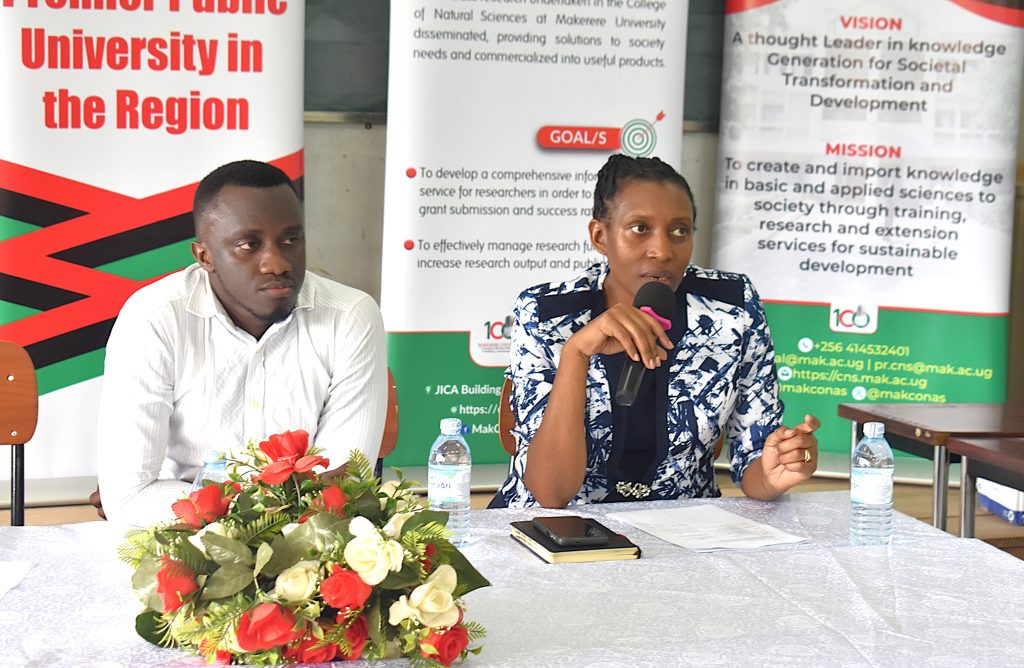
Sharing his personal journey, Mr. John Walugembe offered valuable insights to students, emphasizing the critical importance of time management in shaping a successful career. He encouraged them to cultivate patience, resilience, and integrity as they transition from academic life into the professional world.
Mr. Walugembe also urged the students to maintain an open mind when approaching the job market. “You should not confine yourselves to roles within your academic fields. Remain open to exploring a wide range of opportunities that may arise. You need to approach the job market with flexibility,” he advised.
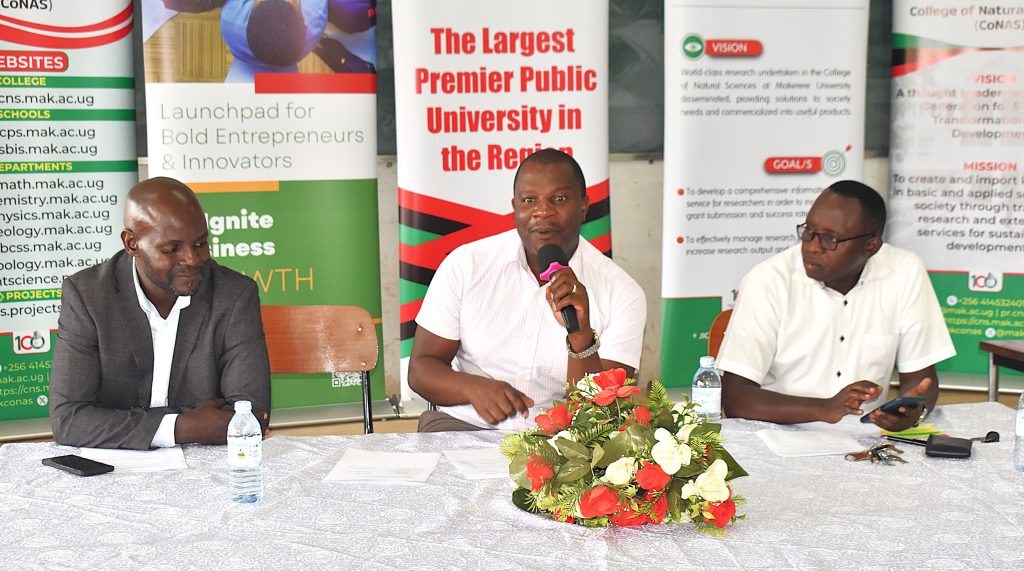
In addition, he highlighted the dual significance of academic excellence and strong professional networks, noting that good grades can open doors, but relationships and connections often determine how far one can go in their career journey. “The best way to build networks is to improve your value,” he advised.
Addressing the students on how to leverage the digital landscape to advance their careers, Dr. Catherine Mbidde emphasized the transformative potential of digital tools in shaping future opportunities. She, however, expressed concern over the growing trend of digital tool misuse – platforms that could otherwise be harnessed to explore career paths and unlock job prospects.
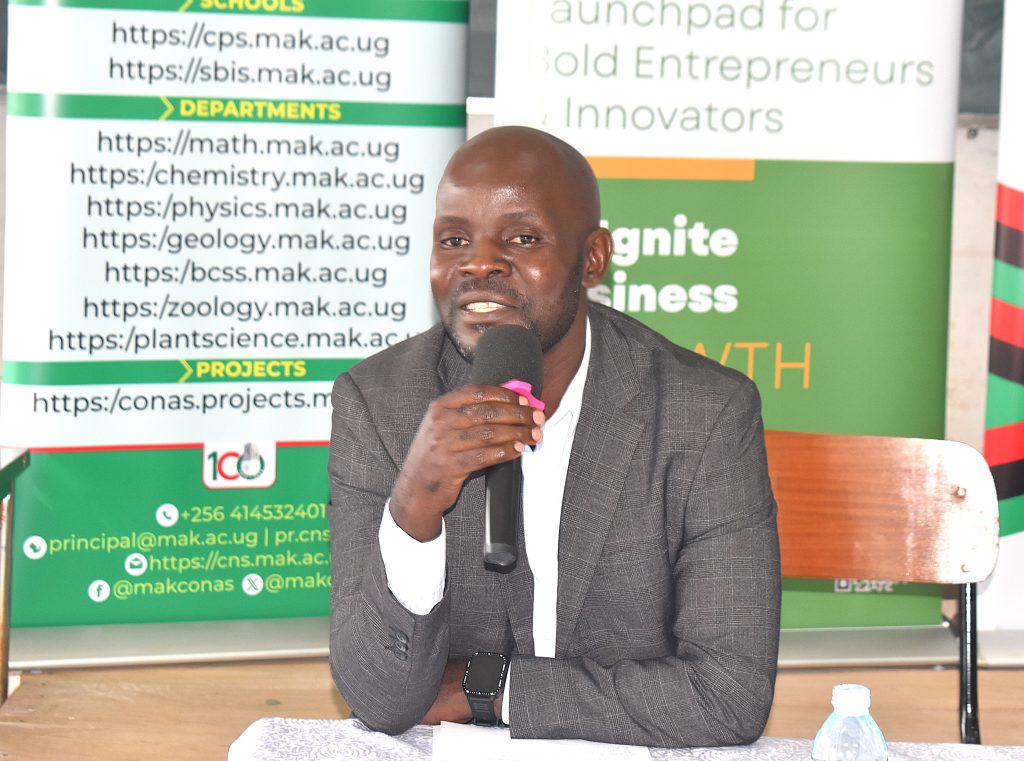
Dr. Mbidde urged the students to invest in nurturing their entrepreneurial skills, encouraging them to proactively develop plans, engage in regular self-assessment, and seek out mentors who can offer guidance and support along their professional journeys. She underscored the importance of spiritual grounding, advising students to cultivate a strong relationship with God as a source of direction and resilience in navigating the complexities of their career paths.
Mr. Basiima Collins from UniPod emphasized the importance of a mind-set shift as graduates navigate their career paths. He urged students to actively participate in networking events and foster an entrepreneurial mind-set, stressing that these actions are essential for personal and professional growth. “By embracing opportunities for networking, you can build valuable connections and open doors to new possibilities. Additionally, cultivating an entrepreneurial mind-set allows you to approach challenges with creativity, resilience, and a proactive attitude, which are crucial qualities for success in today’s dynamic job market.”
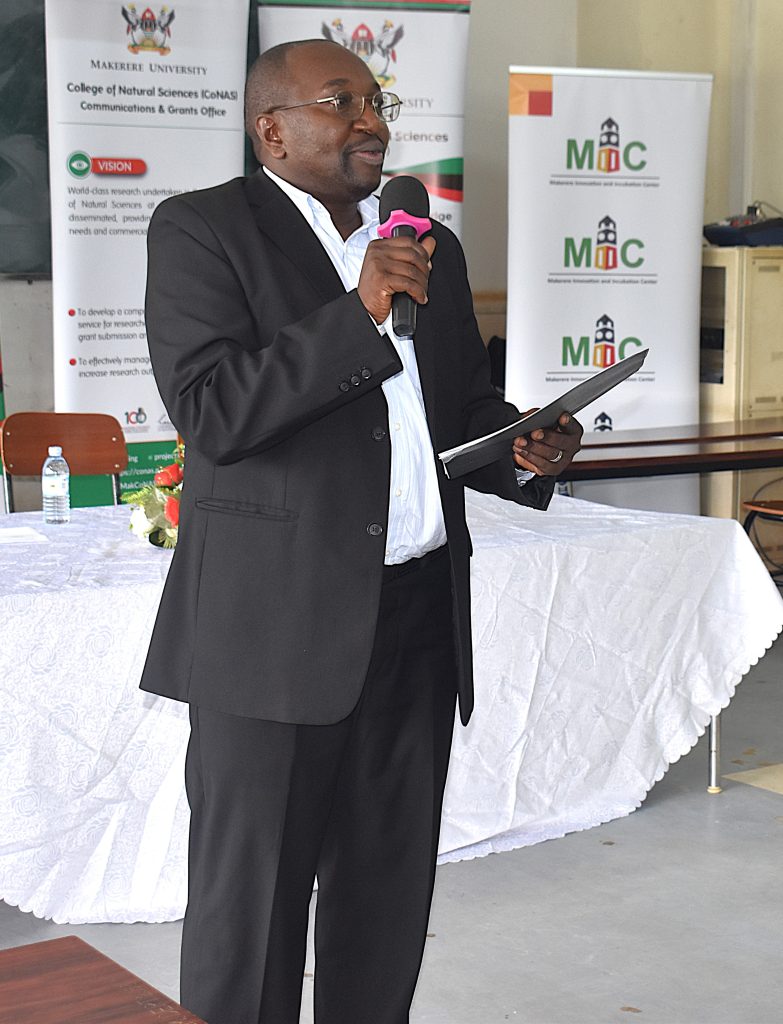
Addressing students on the significance of mental health in the journey of career development, Dr. Alex Behakanira emphasized the need to remain open-minded and adaptable. He noted that although job opportunities may appear scarce, the broader landscape of opportunities remains vast and ever-evolving. Dr. Behakanira encouraged students to strive for relevance not only in their professional environments but also within their homes and communities, underlining the importance of being well-rounded individuals. Echoing this sentiment, Mr. Henry Nsubuga stressed the importance of safeguarding one’s mental well-being throughout their career path. He advised students to cultivate a resilient mind-set and to be intentional about steering clear of situations that may lead to emotional distress or depression.
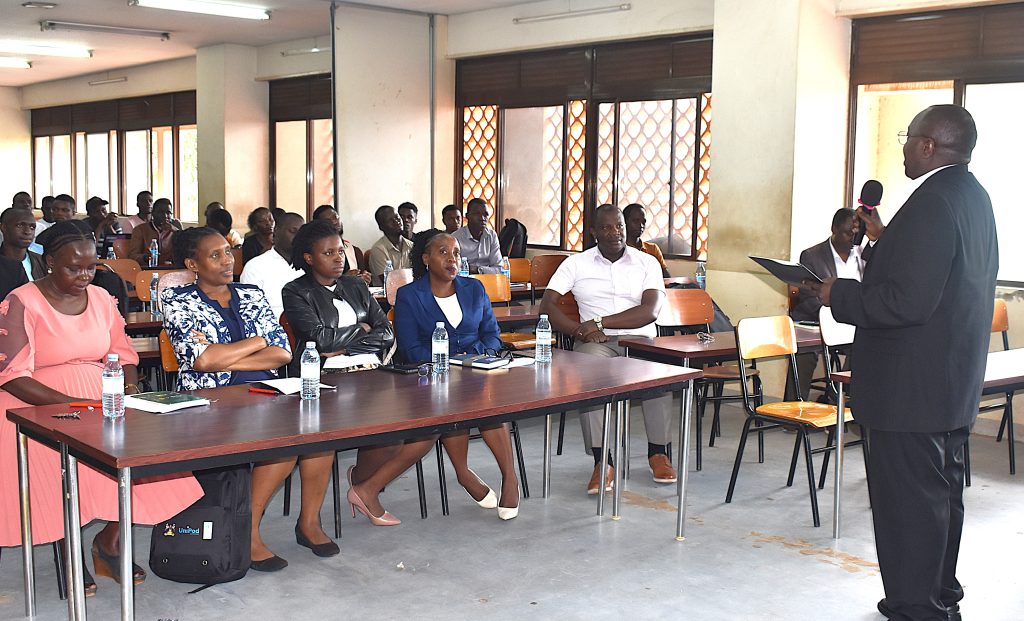
In his remarks, Prof. Juma Kasozi, the Deputy Principal of the College of Natural Sciences (CoNAS) and Head of Academics, expressed his appreciation for the initiative. He commended the effort as a timely and strategic intervention aimed at equipping students with the practical knowledge and emotional resilience necessary to navigate the dynamic and often challenging world of work. Prof. Kasozi emphasized that such initiatives play a crucial role in bridging the gap between academic theory and real-world application. He extended sincere gratitude to the seminar coordinators, praising their foresight and dedication in conceptualizing and organizing the programme.
The Terminal Seminar will be held on an annual basis.
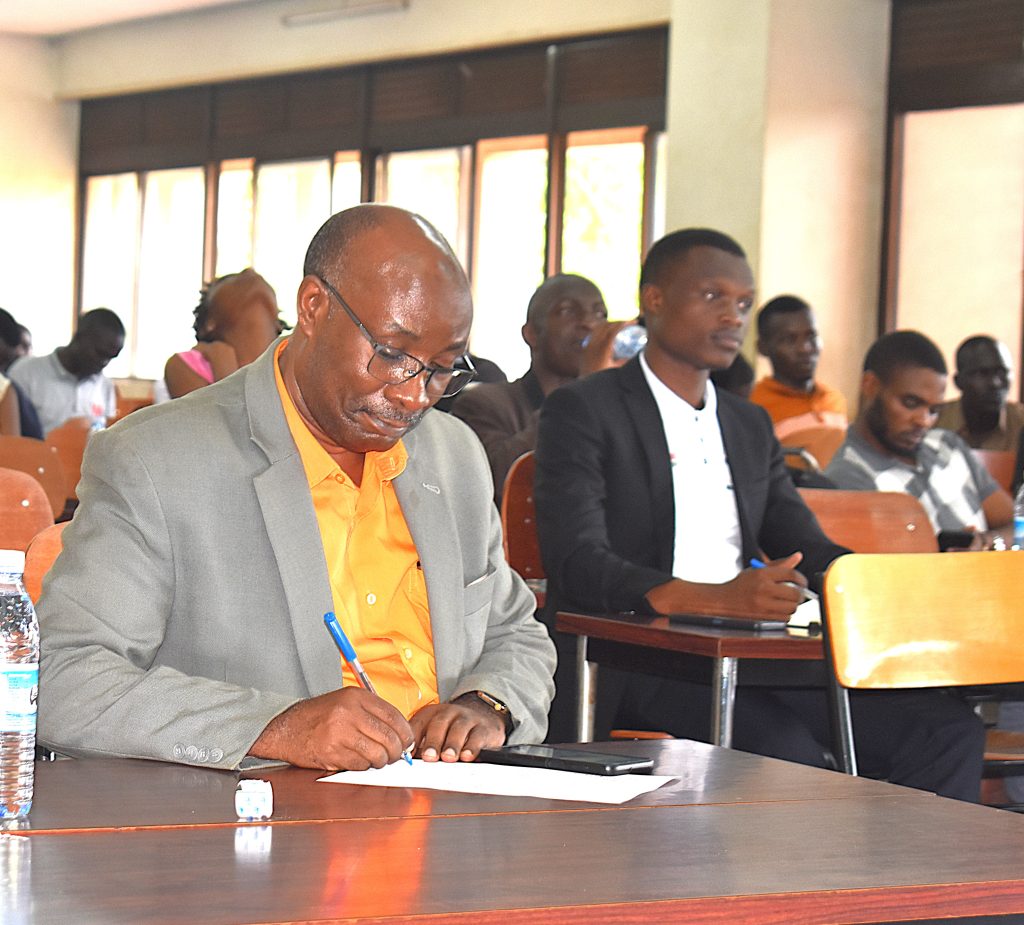
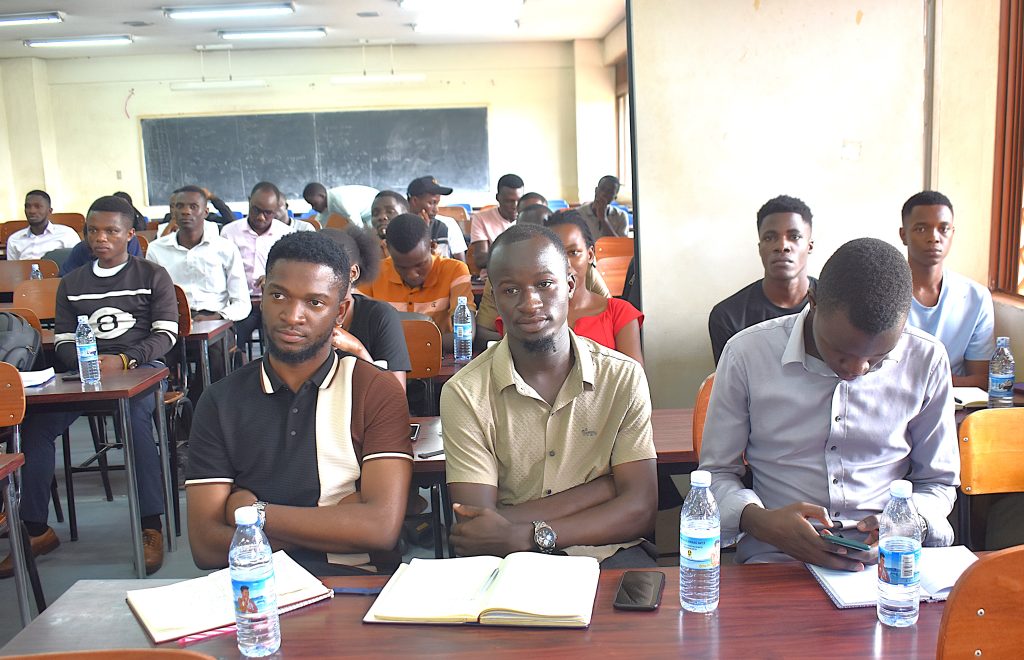
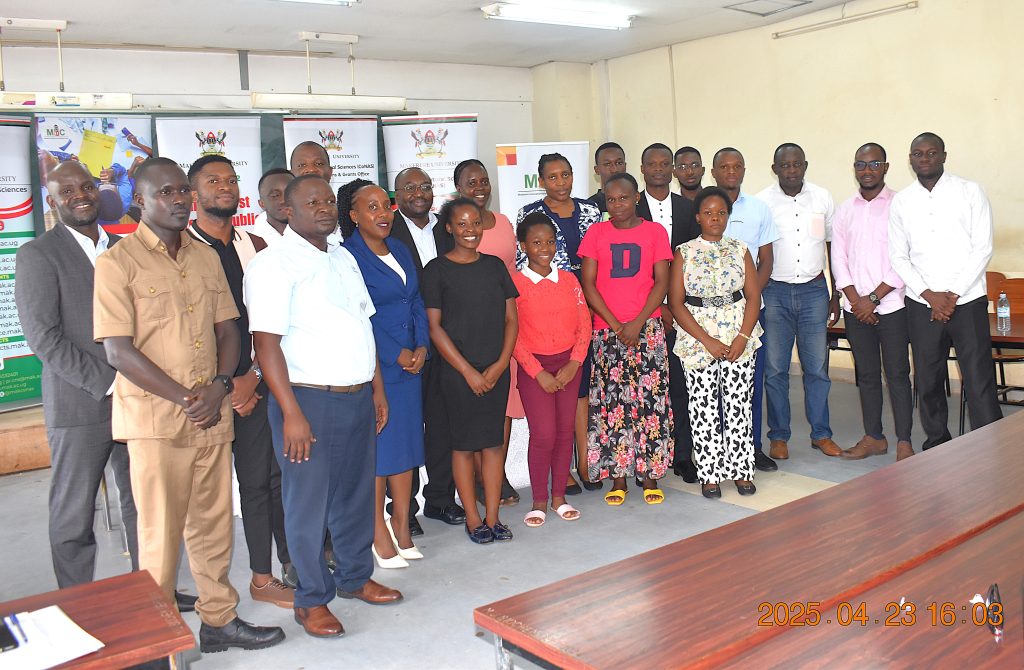
Trending
-

 General6 days ago
General6 days agoMature Age Scheme Exam Results for 2025/2026
-

 General1 week ago
General1 week agoFreshers’ Joining Instructions 2025/2026
-

 General2 days ago
General2 days agoUndergraduate Admission List Self Sponsorship Scheme 2025/2026
-

 General2 weeks ago
General2 weeks agoMastercard Foundation Board pays its inaugural visit to Makerere University
-

 General1 week ago
General1 week agoUVCF Makes Case for HEAC Programme
